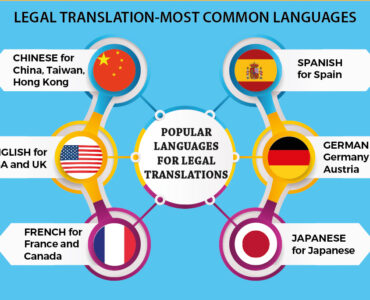In today’s globalized economy, businesses are no longer confined by borders. Companies are expanding their reach, tapping into new markets, and forging partnerships with entities across the globe. However, with these opportunities come challenges, particularly in the realm of legal documentation. Accurate legal translation has become an essential service for companies engaging in cross-border business transactions. A single mistranslation in a contract or legal agreement can have severe consequences, making it imperative for businesses to invest in professional legal document translation services.
The Role of Legal Translation in International Business
Legal translation involves converting legal documents and texts from one language to another, ensuring that the translated version accurately reflects the original content. This process is far from simple: legal language is complex, filled with specific terminology, and often varies significantly from one jurisdiction to another. As businesses expand internationally, they encounter diverse legal systems, each with its own nuances and specificities. Legal translators must not only be fluent in the languages involved but also deeply knowledgeable about the legal systems and terminologies of both the source and target languages.
Why Accuracy Matters
In the world of business, the stakes are high, and even a minor error in legal translation can lead to serious repercussions. For instance, a mistranslation in a contract clause could result in one party misunderstanding their obligations, leading to a breach of contract. This could trigger a legal dispute, costing both parties time, money, and potentially damaging their business relationship.
Moreover, legal documents such as patents, intellectual property agreements, and regulatory compliance documents require precise translation to ensure that the business’s rights and obligations are clearly defined and protected. An inaccurate translation could leave a company vulnerable to legal challenges, especially in jurisdictions where the legal system is significantly different from their own.
Regulatory Considerations in Legal Translation
Legal translation isn’t just about linguistic accuracy—it also plays a crucial role in ensuring compliance with international regulations and local laws. Many jurisdictions have strict requirements for translated legal documents, and failure to meet them can lead to contract invalidation, financial penalties, or legal disputes.
Key Regulatory Frameworks that Demand Accurate Legal Translation
1. General Data Protection Regulation (GDPR) – EU
- Companies operating in the EU must ensure that privacy policies, contracts, and consent forms are accurately translated into the official languages of the countries they operate in.
- Mistranslations in data processing agreements can lead to non-compliance fines of up to €20 million or 4% of annual turnover. While not directly related to mistranslation, one pertinent example involves the French Data Protection Authority (CNIL) imposing a €1.5 million fine on Dedalus Biologie in April 2022.
2. United States Federal and State Regulations
- The SEC (Securities and Exchange Commission) requires accurate translation of financial disclosures for foreign companies operating in the U.S.
- Immigration law and employment contracts require certified translations in compliance with USCIS standards.
3. China’s Corporate & Commercial Laws
- Foreign companies entering China must submit official business licenses, articles of incorporation, and contracts in Mandarin.
- Courts often prioritize Chinese-language contracts over English in disputes, making accurate translation essential.
4. Latin America’s Notarization & Translation Laws
- Many Latin American countries require notarized translations for legal documents such as contracts and court filings.
- Errors in translations may require businesses to redo paperwork, delaying transactions.
Key Takeaway
When handling cross-border transactions, businesses must work with experienced legal translators who understand both legal terminology and local compliance requirements to avoid regulatory pitfalls.
Case Studies: The Real-World Impact of Legal Translation
The importance of accurate legal translation is best illustrated through real-world examples. Consider the case of a major pharmaceutical company that was expanding its operations into a new market. The company needed to translate its licensing agreements, which contained complex legal and technical language, into the local language. A minor error in the translation led to a misunderstanding regarding the scope of the license, resulting in a costly legal battle and delays in the company’s market entry.
In another instance, a technology firm involved in a merger faced significant challenges due to a poorly translated contract. The original contract, drafted in English, contained a specific clause that was mistranslated into the target language. This error resulted in a disagreement over the interpretation of the clause, leading to months of negotiation and legal fees before the issue was resolved.
These examples highlight the critical need for businesses to work with professional legal translators who have the expertise and experience to ensure that their legal documents are translated accurately and effectively.
The Critical Need for Accurate Translation of Software Licenses and EULAs

The translation of software licenses, End-User License Agreements (EULAs), Terms and Conditions (T&C) and related documents is crucial in the global market. These documents outline the legal rights, obligations, and restrictions for users and developers, making accuracy essential. Proper translation ensures that users in different regions clearly understand the terms, helping to prevent legal disputes and compliance issues. It also protects the software developer’s intellectual property and maintains the integrity of the software’s use. Without precise translation, misunderstandings can arise, potentially leading to unauthorized use or breach of contract. Investing in professional translation for these critical documents safeguards both the company and the user, ensuring clarity and legal protection across languages and jurisdictions.
The Risks of Cutting Corners
While it may be tempting for businesses to cut costs by using automated translation tools or less expensive, non-specialized translators, the risks far outweigh the potential savings. Automated tools, while useful for general language translation, are not equipped to handle the complexities of legal language. They often fail to capture the nuances and context required for accurate legal translation, leading to errors that could have serious legal implications.
Similarly, non-specialized translators may lack the legal knowledge necessary to accurately translate complex legal documents. The result is often a translation that, while technically correct, fails to convey the precise meaning and intent of the original document.
The Value of Professional Document Legal Translation Services
Given the potential risks and consequences of inaccurate legal document translation, it is clear that businesses should prioritize working with professional legal translation services. These services employ translators who are not only language experts but also possess a deep understanding of legal terminology and the specific legal systems involved. They ensure that every detail is accurately translated, preserving the meaning and intent of the original document.
Investing in professional legal translation services is not just about avoiding risks; it is also about protecting your business interests and ensuring that your cross-border transactions are conducted smoothly and effectively. Accurate legal translation facilitates clear communication, builds trust between parties, and ultimately contributes to the success of your international business ventures.
Conclusion
As businesses continue to expand globally, the importance of accurate legal translation cannot be overstated. Whether negotiating contracts, protecting intellectual property, or ensuring regulatory compliance, professional legal translation services play a crucial role in safeguarding your business interests. By investing in quality translation services, businesses can navigate the complexities of cross-border transactions with confidence, minimizing risks and maximizing opportunities in the global marketplace.





Hello, I would like to use a quote from this article in my thesis. Is it possible for you to reveal who is the author of the article?
Hi Dennis, thanks. Please feel free to link to our article. The author is one of our staff writers.